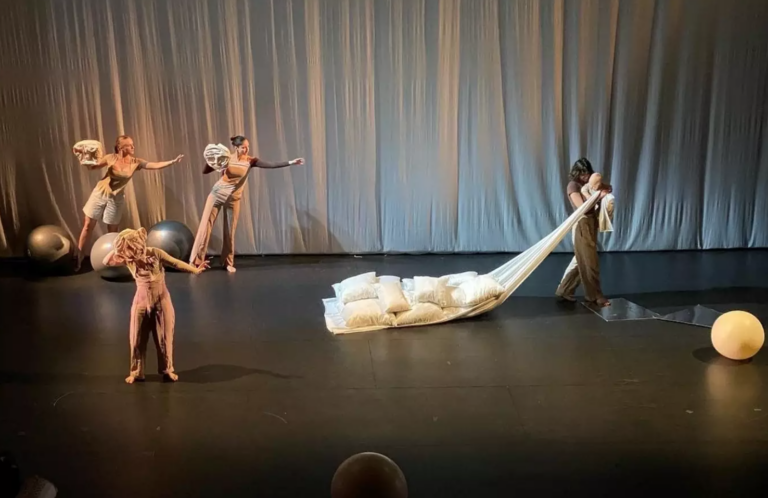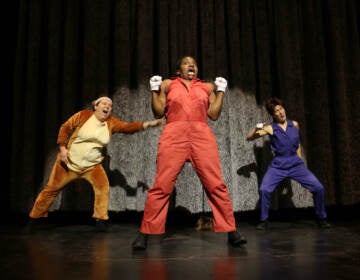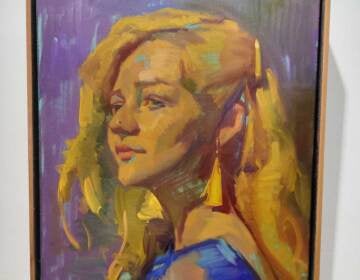Ukrainians bring contemporary theater to Philadelphia
“Mothermotherland” was devised by artists who fled Kharkiv, now based in Pittsburgh. It is presented by Philly’s Miniball festival.
Listen 1:20
Mothermotherland (Cannonball Festival)
A group of Ukrainian theater artists, having fled their hometown of Kharkiv during the ongoing Russian invasion, will be in Philadelphia this weekend to perform a play of their own devising, “Mothermotherland.”
Apropos of the title, one of the performers is an infant, Lili, less than one year old, and the daughter of company founder Audrey Rose Dégez. During the performance, Lili is passed among all the women in the group.
“She’s with her five mothers,” Dégez said. “In the beginning of this project, I wouldn’t have been able to pass her to somebody else without her crying. Whereas now she goes to different people and can even play with them and be fine because she’s lived in this matriarchal commune for the last three months where she has multiple mothers.”
“Mothermotherland” will have its Philadelphia premiere Saturday at the Christ Church Community House, in Old City, as part of Miniball, a 10-day performance festival as a smaller version of the Fringe Festival’s Cannonball hub.
Last winter Dégez, a graduate of Rutgers University who normally resides in France, was about to begin a theater residency in Kharkiv with her new baby on her hip, born February 1, but was thwarted by the invasion by Russian forces on February 24th.
Instead, she landed in Pittsburgh where she put out a call for theater artists in Kharkiv to come to the U.S. to create a theater project, Slovo. Theatre Group, rooted in Ukrainian culture.
“Even before the invasion, my project proposal was about shining light on the cultural oppression in Ukraine that has been going on for a hundred years,” Dégez said. “I found that the silver lining of this invasion was that people finally started asking: What is Ukraine? Where is Ukraine? They became curious about Ukraine. So it became this opportunity to find funding and people who were willing to support bringing a project here in America.”
The Slovo group used as its source material a 1924 short story “I am (Romance)” by the early 20th-century Ukrainian author Mykola Khvylovy. A member of the Communist party during the Soviet era, Khvylovy lived in Kharkiv as a champion of Ukrainian culture, openly opposed to the cultural and political dominance of Moscow. He wrote the story from the perspective of an officer whose job was to enforce death sentences on rebels against the Communist Party.
While Khvylovy was not part of Stalin’s Cheka secret police, the story is loosely based on himself and his opposition to Soviet Russia.
In response, in part, to Stalin’s removal of writers and artists seen as threats – thousands were arrested and many died in prison as part of the so-called Executed Renaissance – Khvylovy committed suicide in 1933. That was four years before Stalin began a program of mass executions, known as the Great Purge.
After his death, Khvylovy’s works were banned in the Soviet Union until its collapse in 1991.
Yulia Linnik, one of the artists in the Slovo group who grew up in Kharkiv, said Khvylovy’s work is now widely read in Ukraine.
“It’s a very popular story,” she said of “I am (Romance).” “It’s part of the school program. When I was taught in the school I knew about that story.”
“Mothermotherland” does not begin with “I am (Romance),” nor with Khvylovy, but rather with the stories of the six women on stage.
“Hi. My name is Yulia,” are the first words spoken, as Linnik introduces herself to the audience from the stage, then describes her city of Kharkiv. One by one the other four women – Dégez, Daria Holovchanska, Olesia Zakharova, and Veronika Shuster (five if you include Lili) – enter and introduce themselves, each using the name Yulia.
Lili, who seems thrilled to be onstage, introduces herself with nonverbal vocalizations.
“I think we’re always talking about us. Even when we’re talking about Hamlet or Ophelia or King Lear, we’re always talking about us,” said Linnik. “And there are parallels in a story that happened almost 100 years ago and what’s going on right now. They have the same pattern.”
The approximately 50-minute performance uses a spare set; the stage remains mostly bare except for large inflated balls that are used for a variety of purposes. The actors, dressed in contemporary, earth-toned clothes, rely mostly on each other to achieve theatricality, supporting one another vocally and through dance movements.
Through it all Lili remains on stage, passed from one set of arms to another, witnessing it all. Dégez said Lili has her good nights and her bad nights, but mostly she loves the attention.
“We’re talking about really difficult subjects. We’re talking about acts of war. Kharkiv, throughout this whole project, has been bombed nonstop,” Dégez said. “We’re talking about a man who committed suicide almost 100 years ago because all of his friends and colleagues would be subsequently arrested and exterminated.”
“Lili has naturally become this symbol of life, of innocence, hope, creativity, curiosity,” she said. “But at the same time it’s very scary because she’s so vulnerable.”
The Slovo project has gone on longer than expected. What was supposed to be a brief theater experiment has blossomed into an extended tour lasting five months, including a recent performance at the Kennedy Center in Washington DC.
After the Philadelphia performance this weekend at the Christ Church Community House in Old City, as part of the Miniball festival, Slovo Theatre will continue to take the show to other cities in the Northeast U.S.
The tour will end with a final performance in New York on January 20. After that, the artists finally will go home.
“This has been a very intense project, intense residency, living together, traveling together, working together, developing together,” Dégez said. “We’re just going to let it breathe.”

Get daily updates from WHYY News!
WHYY is your source for fact-based, in-depth journalism and information. As a nonprofit organization, we rely on financial support from readers like you. Please give today.






